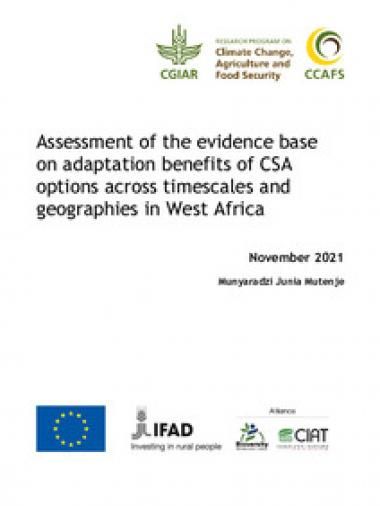Assessment of the evidence base on adaptation benefits of CSA options across timescales and geographies in West Africa

Climate change is causing unpredictable alterations in weather patterns such as high temperatures, rainfall variations and strong winds in west Africa. These changes in climate are contributing to food insecurity, reduced agricultural production and incomes. The impacts on agricultural production vary across countries not only in the intensity but also on how they interact. Understanding the adaptive capacity (AC) of smallholder farmers is crucial to planning effective agriculture adaptation and building resilient farming systems. Using data from Ghana, Mali, Niger, and Senegal over the last 10 years, this study aimed to understand the AR4D Climate-Smart Village approach’s contribution to intentional/ planned climate change adaptation by farm households. The study also examined the impact of Climate-Smart Agricultural (CSA) practices’ implementation and access to climate information service on household food security and adaptive capacity. Based on the mixed method the findings indicated that more than fifty percent of the smallholder farmers in West Africa had observed an increasing trend of multiple climate hazards, with strong winds, droughts, high temperature and irregular rains occurring simultaneously and more frequently. Farmers’ coping strategies varied depending on the climate hazard experienced. Households used a combination of financial, consumption and livelihood strategies. While asset selling and borrowing were important for decreased rains and irregular rains. Livelihood diversity is an important coping strategy for climate risk induced agricultural production and income reduction. The findings also indicated that credit access is an important ex-ante and ex-post coping strategy for enhancing smallholder households’ absorptive capacity. The findings highlighted that the CSA practices implemented varied by nature and degree of the climatic hazards in the four countries. Crop rotation, improved crop varieties, organic fertiliser and tied ridges were the CSA practices commonly implemented in Ghana by more than 75% of the farmers in the communities directly benefiting from the project. It was further revealed that 23% and 38% of the Mali farmers from the direct beneficiaries implemented improved crop varieties and micro-dosing of fertiliser respectively. Farmer managed natural regeneration (FMNR), organic fertiliser, Cassia Toro growing, and intercropping were the CSA strategies implemented by more than 50% of the households in the communities directly benefiting from the project in Niger. In ii Senegal, FMNR and improved crop varieties were the CSA strategies implemented by more than 25% of the households in the communities directly benefiting from the project. Overall, smallholder households in Ghana, Mali and Niger implemented a combination of soil water conservation strategies, wind breaks, soil fertility and productivity improvement strategies to deal with the multiple hazards. The findings showed that Senegal and Mali had higher proportion of households 50% and 41% respectively with low adaptive capacity. Disparities in adaptive capacity index were explained by access to credit and climate information services, combination of CSA implemented, and land size allocated to the CSA practices. Collectively, the ordinary least square results emphasised that access to climate information and land, implementation of CSA practices that improves adaptive capacity of farmers, the increased number of community-based organisation that promote CSA and education of the household head are central factors for enhancing household food security in West Africa. The finding also highlighted the importance of improving adaptive capacity of farmers through increased access to land, climate information for informed CSA strategies prioritisation and credit for agricultural activities among other factors as a viable option to build resilient smallholder farming systems in West Africa.
Citation
Mutenje MJ. 20201. Assessment of the evidence base on adaptation benefits of CSA options across timescales and geographies in West Africa. CCAFS Report. Wageningen, the Netherlands: CGIAR Research Program on Climate Change, Agriculture and Food Security (CCAFS).